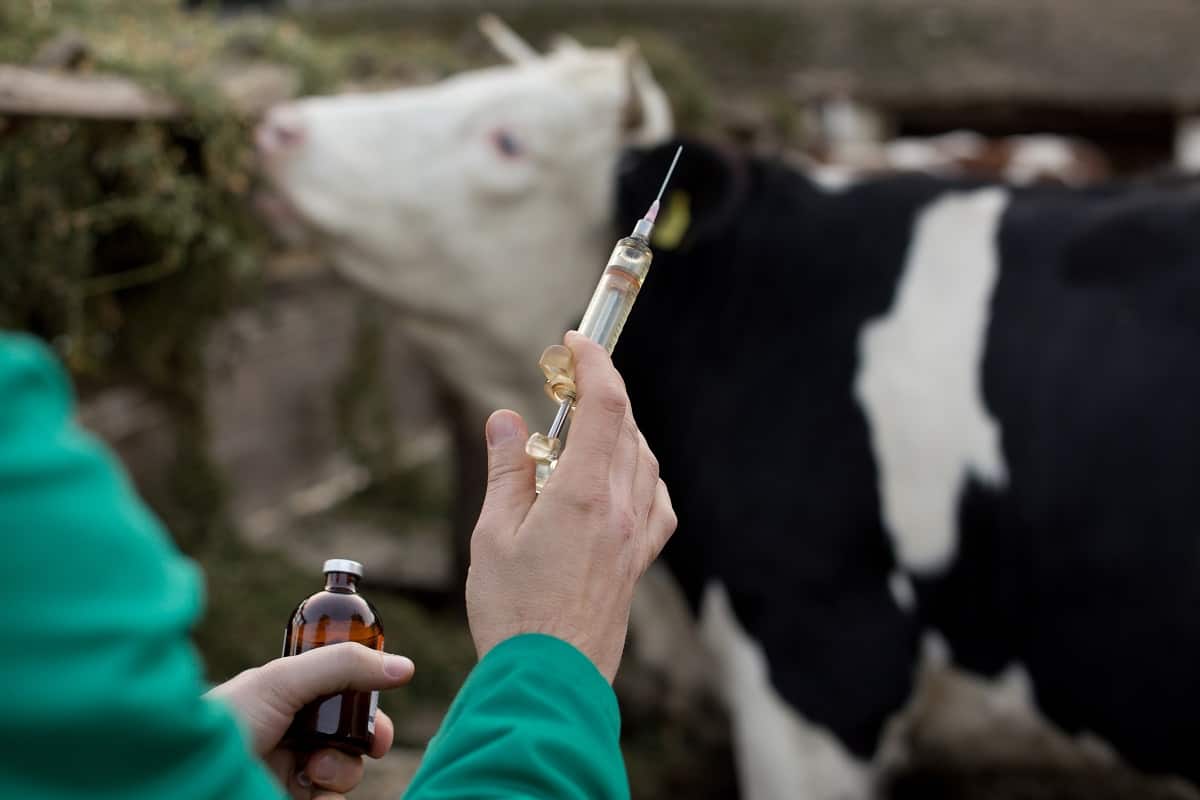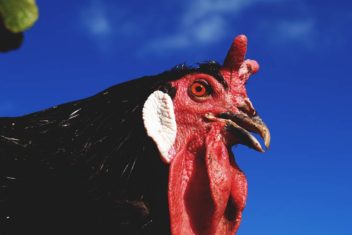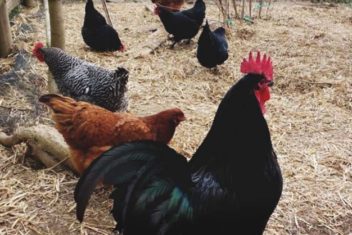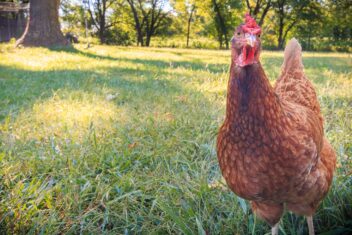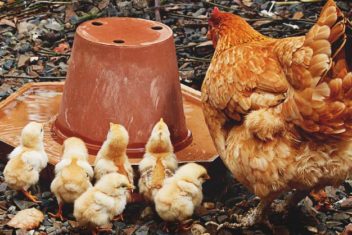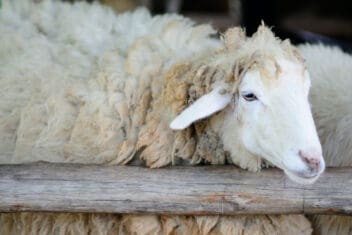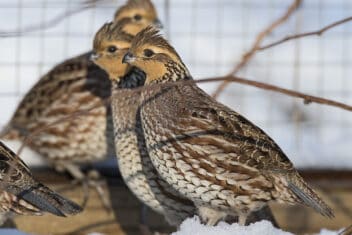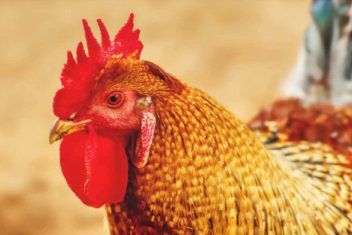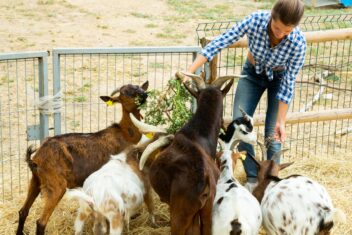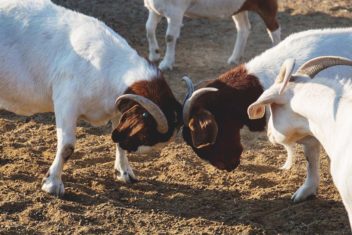There are a few things that we always have on hand here at the farm.
Surgical scissors, needles and syringes, Blu-Kote, latex gloves…
…and B12 supplements.
Vitamin B12 (the same vitamin B12 that we rely on, as humans, to stay healthy) can be provided to livestock like sheep, chickens, and pigs in liquid or injectable form.
Although it is not necessary as a regular part of their daily diets, it poses many benefits when used as an emergency or healing supplement.
Here’s what you need to know about providing B12 to livestock.
What is the B12 Supplement?
Vitamin B12 is essential for healthy and normal growth in most animals. Mostly, it is produced naturally by animals.
In sheep, for instance, it is produced from cobalt in the rumen (and cobalt is found in most mineral supplements as well as through natural grazing).
You may already have heard of B12, since it’s an essential nutrient for humans, too. We need it to keep our nerves and blood cells healthy. It can also prevent anemia. B12 is unique because it is the only nutrient in the human diet that must come from animal products.
As with humans, animals can also be deficient in this nutrient. For grazing animals, like sheep, vitamin B12 deficiency is more common when there are cobalt deficiencies in the soil.
Other animals, like pigs, normally receive their allotment of B vitamins through commercial feed mixes. Unfortunately, deficiencies can sometimes occur if a mixture was not formulated correctly through manufacturing or mixing errors.
B12 can be administered in an injectable form, but it is often easier to give it to animals with a liquid solution such as Rooster Booster. This generally exists as a super-concentrated mixture of pure B-12 in a palatable (somewhat sweet-tasting) form.
You can then mix the solution into feed, administer with water, or deliver it to your animals in a syringe or oral dosing gun.
Benefits of B12 for Livestock
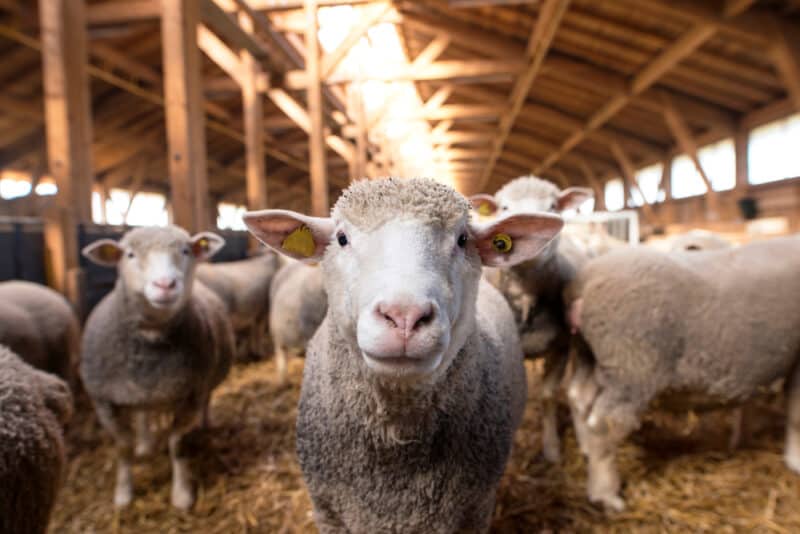
B12 has a variety of benefits. Not only can it address symptoms of vitamin deficiency (which I’ll mention in a bit below) but it also can help species bounce back from stress or periods of illness. It can also boost appetite, improve alertness, and oxygenate the blood.
Think of it as a big fruit smoothie you might drink when you’re sick – it offers a supercharged dose of nutrients to your animals exactly when they need it most.
For sheep, who are especially prone to anemia as a result of parasitic infestations, it is especially helpful in getting them to recover.
If you’re planning on raising breeding animals, B12 is also essential in helping them stay in tip-top shape. It is easy to administer and can be stored for a long period, especially if it is refrigerated.
Which Animals Benefit from B12?
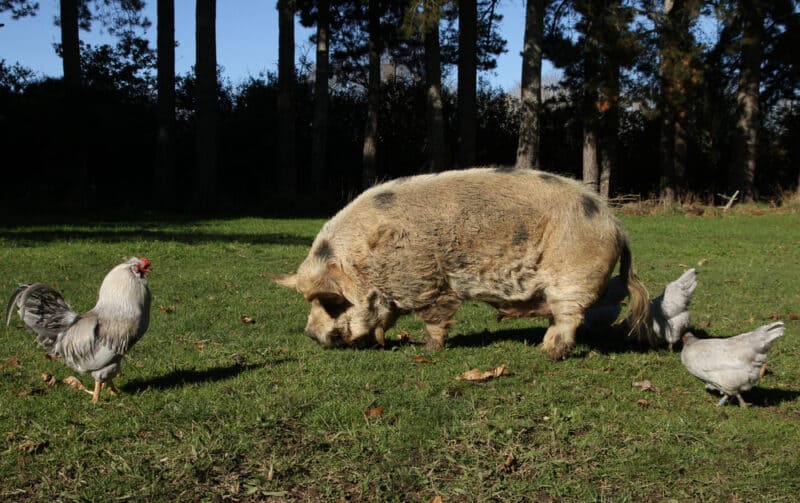
Many species of livestock benefit from B12 supplementation, including sheep, chickens, and pigs.
Below, I’ll detail some signs of B12 deficiency per species, and other conditions that benefit from B12 supplementation.
B vitamins are not fat-soluble and therefore not stored in the body in significant amounts. B12, however, is the exception. An animal will usually discard any excess that it eats.
Some will argue that ruminants, horses, and rabbits do not need external supplementation. They produce enough in their digestive systems via bacterial fermentation. Pigs and poultry require external supplementation.
However, although ruminants like sheep shouldn’t need B12 supplementation, that doesn’t mean that is always the case. B12 deficiency can still occur and this vitamin may still be needed.
1. Sheep, Goats, and Cattle
Sheep and other large livestock such as goats and cattle need B12 for normal growth. Normally, they can produce it on their own from cobalt in the rumen. This is true for all other ruminating animals, including goats, too.
Unfortunately, vitamin B12 deficiency can occur for several reasons. Usually, this is because of cobalt deficiency in the soil or in the mineral supplementation that you provide your sheep.
If your sheep are deficient in B12, they may exhibit symptoms such as:
- Anemia
- Weeping eyes
- Reduced growth rate
- Lethargy
- Poor appetite
- Lower birth rates
- Reduced fertility
- Higher parasite loads
- Poor wool production
Some studies suggest that administering B12 can help lambs heal more quickly after periods of illness or injury and also can reduce flystrike.
Pregnant animals can transfer vitamin B12 to a growing fetus, but do not supply any of the vitamins in their milk. While cobalt occurs naturally in the soil, it does not do so predictably. For example, heavy rainfall can leach cobalt from the topsoil and make it more difficult for it to be available to grazers.
It is important to note that rapidly growing animals, like calves and lambs, are more susceptible to B12 deficiency and sheep are more susceptible than cattle for reasons unknown.
2. Chickens
Chickens are more at risk for B12 deficiency if they are suffering from various digestive or gastrointestinal issues. If you’ve recently treated your chickens with antibiotics, it’s a good idea to supplement with B12 while their gut microbiomes get realigned. However, you may find that chickens of all ages (even chicks) are occasionally prone to B12 deficiency.
Some signs of B12 deficiency in chickens include:
- Leg weakness
- Nervous system impairment
- Perosis
- Poor feathering
- Reduced hatch rates (from deficient parents – embryos frequently die at around 17 days old)
Most commercial chicken feed contains B vitamins, so B12 deficiency is less common. However, particularly when you are hatching your own chicks, B12 deficiency can still occur.
3. Pigs
Vitamin B12 deficiency is less common in swine, however, it can still occur. The reason it is less common is that it is included in most commercial pig feeds, as with poultry.
Occasionally, though, these commercial feeds aren’t mixed perfectly. Mistakes can happen and pigs can develop B vitamin deficiencies. If your pig is deficient, you may notice signs such as
- Reduced feed intake
- Poor growth
- Lethargy.
How to Use B12: Tips to Consider
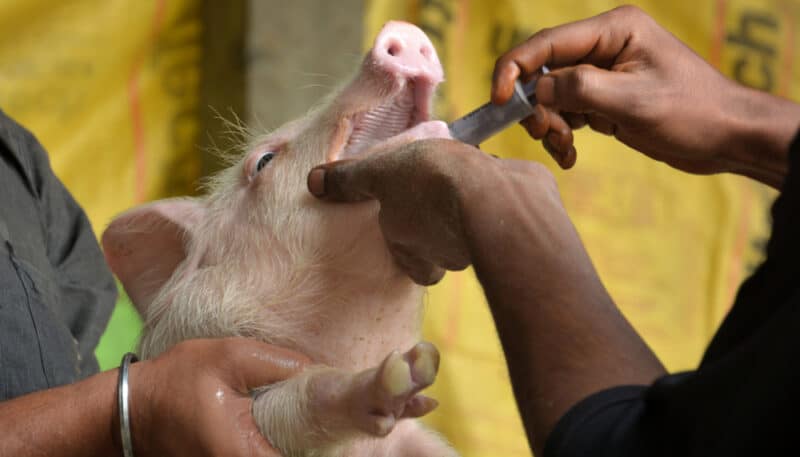
Here are some other tips to consider when administering B12.
1. Choose the Right Formulation
You can administer B12 as an injection, but often it is easier and less stressful for the animal to give it as an oral drench or in the water.
On my farm, we keep a multi-species B12 solution on hand that can be administered to any species of livestock we have on the farm (we raise sheep, chickens, and pigs, but the solution could also be used for goats and cattle or even domesticated pets).
However, you can also purchase species-specific solutions that may be better suited to your needs.
2. Dose Based on Species and Weight
B12 is generally considered safe to use on animals of all ages.
When administered in a liquid form, you can apply 1cc-3 cc to 1 oz to a gallon of water per day, although this will vary based on the animal.
For oral B12 solutions like Rooster Booster, these are the dosing recommendations based on species:
- Cattle: 1 fl oz
- Chicken: 1cc-3cc
- Horse: 1 fl oz
- Swine: ½ fl oz
- Sheep/Goats: 10cc-20cc
- Dog: 10cc
- Rabbit: 1cc-3cc
- Cat: 3cc-8cc
3. Mix With Water or Deliver Straight
If you are administering an oral B12 solution, you can often mix it with water or into the feed to make it more palatable for your animals. However, most can also be administered via an oral drench, something that’s useful if you only have a few individual animals that need to be treated.
You can also give B12 as an injection, which may provide more targeted treatment but can occasionally be more time-consuming and stressful for the animal.
4. Use After Worm Infestations
Not only are B12-deficient animals more likely to suffer from internal parasites, but there is also evidence that B12 supplementation can help animals bounce back after suffering from a heavy parasite load.
Good parasite control will allow your animals to make use of the cobalt in the environment and will also prevent populations from overtaking an animal’s weakened immune system.
Therefore, preventing and treating vitamin B12 deficiency is good both for reducing the likelihood of parasite infestation and for helping an animal heal after a worm burden has been lifted.
When to Avoid the Use of B12
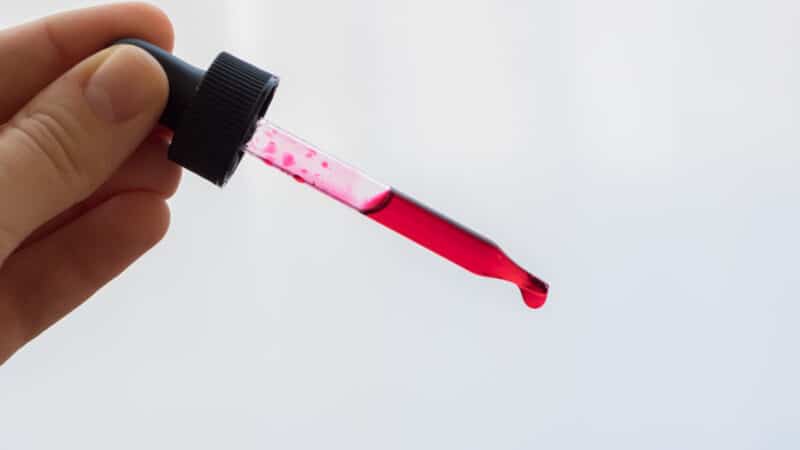
Fortunately, for most animals, it is uncommon to overdose on B12. It is nontoxic when fed in high amounts, with dietary levels of over 100 times the daily requirement being shown as safe in most animals.
That said, it’s important not to use B12 indiscriminately. It’s not a panacea for anything that might ail your livestock – use it only when it’s clear that a vitamin deficiency is what’s causing your animals to be sick.
Whenever possible, if you suspect B12 deficiency, it’s a good idea to get in touch with a veterinarian who may conduct a blood test to determine whether this is actually the case.
While it’s unlikely that your animals can “overdose” on B12, a blood test or other diagnostic tests used by veterinarians can help rule out other issues that may cause symptoms instead.
With that said, consider keeping some B12 on hand for your animals. Although it won’t cure every condition that might affect your animals, it can certainly be used in a wide variety of situations.
